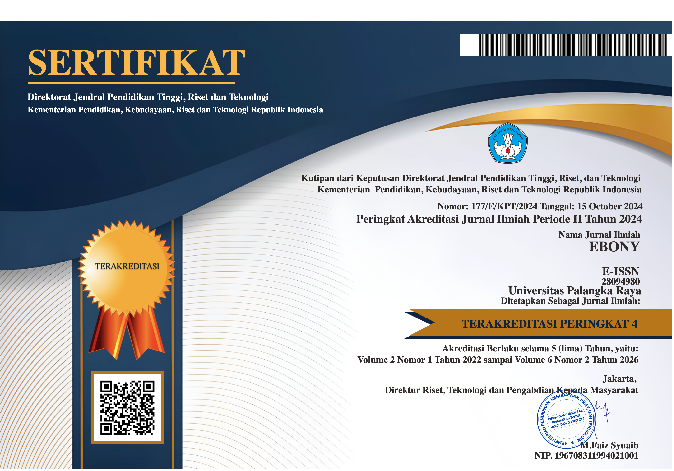Students’ Perception Toward English e-Learning During Covid-19 Pandemic: A Study of the Tenth Graders of SMA Negeri 3 Palangka Raya
DOI:
https://doi.org/10.37304/ebony.v1i1.3100Keywords:
students’ perception, e-learning, covid-19 pandemicAbstract
E-learning has become a mandatory component of all educational institutions as has been decided by the Indonesian goverment during the COVID-19 pandemic emergency period. Policy has demanded that educational institutions should be able to ensure the teaching and learning process that is usually carry out through face to face is transformed into E-learning in order to avoid spreading the virus COVID-19 to students, teachers and other related parties. Even with all the lexisting imitations and constraints, E-Learning must be applie by all levels of education, including the process of English E-Learning. The purpose of this study was to know the students’ perception toward English E-Learning during COVID-19 pandemic and how it impacts students’ motivation to join the online learning during pandemic. The method of this research was desciptive qualitative research. The data were collected through questionaires, interviews, and documentations from 223 respondents of grade X SMA Negeri 3 Palangka Raya. Questionnaire was compiled in Google Form and distributed to students via Whatsapp. Interview was conducted through conversation via WhatsApp and documentation was also done by collecting related government policies with E-Learning during pandemic and document related to the research subject. The findings of this study indicated that students’ perception toward English E-Learning during pandemic was positive, and this has an impact on students’ motivation to join the teaching and learning process well during pandemic. In conclusion, English E- Learning during pandemic has provided very valuable experience for teachers, students and other related parties wich can be used as reference to develop hybrid models of teaching in Senior High Schools.
Downloads
References
Biro Kerja Sama dan Hubungan Masyarakat. 2020. Sikapi COVID-19 Kemendikbud Terbitkan Dua Surat Edaran. Jakarta: Kementerian Pendidikan dan Kebudayaaan.
Cherry, K. 2020. Sample Types and Errors in Research. https://www.verywellmind.com/ what-is-a-sample-2795877. Accessed April 12,
Cohen, L., Manion, L., & Morrison, K. 2011. Research Methods in Education. 7th ed. London: Routledge.
Darmawan, D. 2014. Pengembangan E-Learning. Bandung: PT. Remaja Rosdakarya.
Indrakusuma, A. H., & Putri, A. R. 2016. E-Learning: Teori dan Desain. Tulungagung: STKIP PGRI Tulungagung.
Kemendikbud Resmikan Kebijakan Bantuan Kuota Data Internet 2020. www.kemdikbud.go.id/main/blog/2020/09/kemendikbud-resmikan-kebijakan-bantuan-kuota-dataint.
Kompas.com. 2020. Berita Terkini Hari Ini, Data Covid di Indonesia https://www. kompas.com/covid-19
Kompas.com, 2020. Survei SMRC: Belum Semua Warga Miliki Akses Internet untuk Belajar "Online": https://nasional.kompas.com/read/2020/08/18/21274711/surveismrc-belum semua-warga-miliki-akses-internet-untuk-belajar-online
Kompas.com. 2020. 12 Aplikasi Pembelajaran Daring Gratis, Kerja Sama Kemendikbud https://edukasi.kompas.com/read/2020/03/22/123204571/12-aplikasipembelajaran-daring-kerjasama-kemendikbud-gratis?page=all
Suartama, I. K. 2014. E-Learning Konsep dan Aplikasinya. Singaraja: Universitas Pendidikan Ganesha.
Voice of Indonesia. 2020. Survei SMRC. https://voi.id/es/berita/11530/smrc-survey-thereare-people-who-do-not-have-internet-access-online-learning
Wargadinata, Wildana, Iffat Maimunah, Eva Dewi, Zainur Rofiq.2020. Student’s Responses on Learning in the Early COVID-19 Pandemic. Tadris Journal of Education and Teacher Training, UIN Maulana Malik Ibrahim Malang, Indonesia. https:// www. researchgate.net/publication/342687222.
Downloads
Published
How to Cite
Issue
Section
License

This work is licensed under a Creative Commons Attribution-NonCommercial 4.0 International License.











